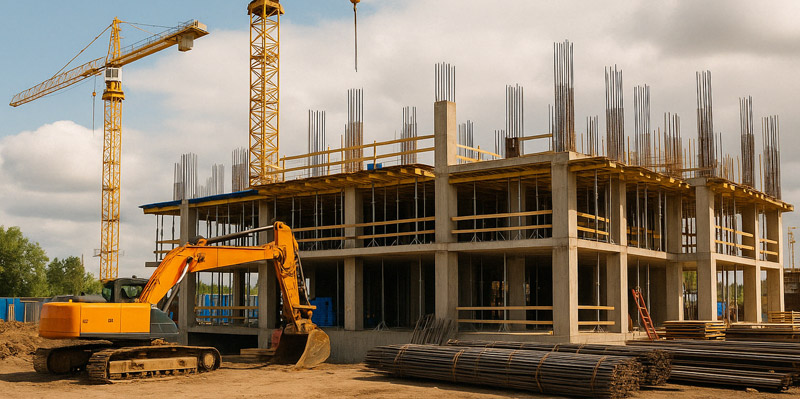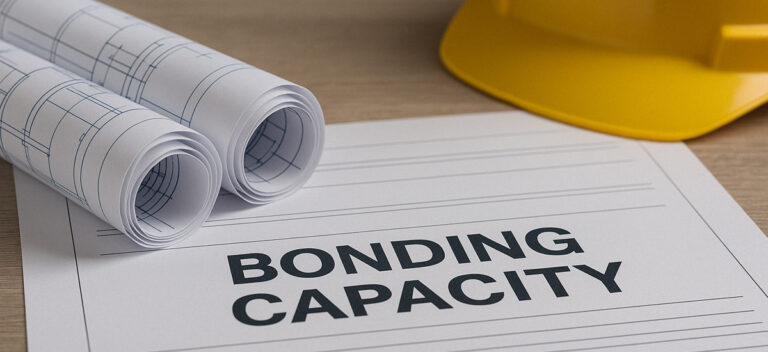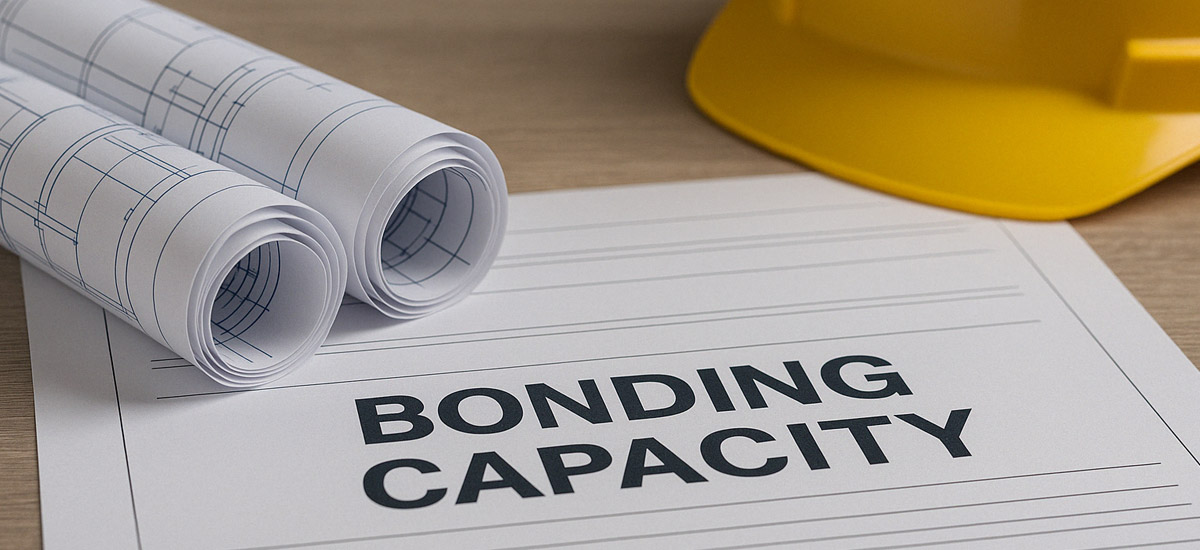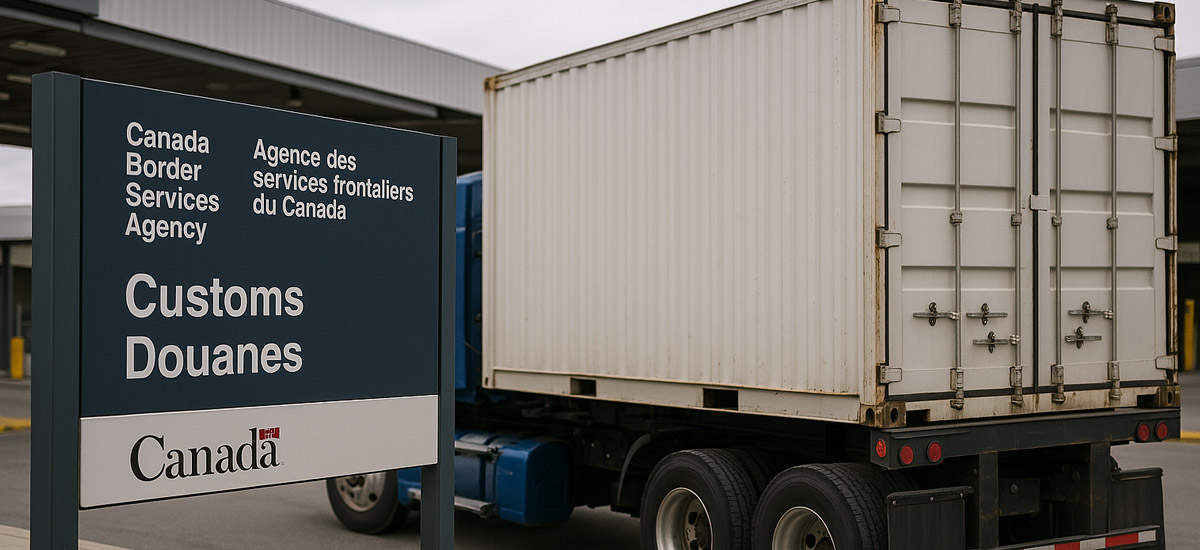If you’re a contractor bidding on public or private projects that require surety bonds, understanding your bonding capacity is essential. It determines which jobs you can pursue, how much bonded work you can take on at once, and ultimately how fast your business can grow.
At Bond Connect, we help Canadian contractors secure and increase their surety bond limits through smart structuring, strategic growth planning, and unmatched broker expertise. In this guide, we’ll break down what bonding capacity is, what sureties look for, and how to increase your limits over time — whether you’re an established contractor or starting up a new company.
What Is Bonding Capacity?
Bonding capacity is the total amount of bonded work your company can be approved to perform. Surety providers assess a range of factors to determine these limits, including your financial strength, past experience, and ability to manage multiple projects at once.
There are two main components of a bond facility:
Single Job Limit: The maximum value of a single bonded project you can undertake.
Aggregate Limit: The total cost-to-complete of all your uncompleted bonded & unbonded jobs combined.
For example, if your bonding facility has a $1.5 million single limit and a $4 million aggregate limit, you can bid on one job worth up to $1.5 million—or several smaller jobs, as long as the remaining cost to complete on total work doesn’t exceed $4 million total.
Although it sounds a bit odd, bonding underwriters will consider unbonded projects a risk as well, as it takes up time and resources to manage these unbonded projects; hence these amounts are still considered in your aggregate work on hand.
Why Bonding Capacity Matters
Your bonding capacity directly influences your ability to secure work. Contractors who want to grow into larger municipal, infrastructure, or government jobs need the bonding capacity to match. Even if you’re capable of performing a job, you won’t qualify to bid unless your bond facility supports it.
Surety companies aren’t just looking at your potential—they’re looking at your proven track record. That’s why increasing bonding capacity is a gradual process rooted in consistent performance, strong financials, and strategic planning.
Thus, when a project comes up that requires a Bid Bond or Performance Bond, you’ll be prepared.

What Do Surety Underwriters Look For?
Sureties evaluate your business much like a bank would review a loan applicant—but with a stronger focus on risk management and operational performance. Here’s what they examine when establishing or increasing your bonding limits:
Experience in the Field
You’ll need to show hands-on experience in the type of work you’re pursuing. Sureties want to know you’ve successfully completed similar projects before and understand the risks and challenges involved.
Completed Projects
A common industry benchmark is that you can typically qualify for a bonded project that is 1.5x the size of your largest completed job. If your largest completed contract was $2 million, your single job limit might be capped around $3 million until you complete a larger one.
Drawing on experience from previous employment experience is also considered by underwriters. If you managed a $20 million contract for a large civil contractor and recently started your own business, there may be room to get a substantial bonding limit even though your company hasn’t necessarily completed projects of the same scale.
This is pending that the corporate financial position matches, which we’ll get into next.
Financial Strength
Your balance sheet and profit & loss matter. Surety companies want to see strong working capital and net equity, both of which demonstrate financial resilience and the ability to fund payroll, materials, and overhead across multiple jobs.
Well-prepared, CPA-reviewed financials—especially those aligned with construction accounting standards—can significantly improve your bond facility terms.
When reviewing an increase in bond capacity for your facility, financial statements are the pinnacle of what underwriters can leverage.
Work On Hand
Sureties look at your total uncompleted workload, also known as your work on hand. They’ll assess whether your current project commitments are manageable before approving more. Efficient management of multiple projects is key to increasing your aggregate bonding capacity.

How to Increase Your Bonding Capacity
Increasing bonding capacity is about more than asking for bigger limits. It involves a long-term strategy rooted in controlled growth, improved financial performance, and demonstrated success. Here’s how to do it:
Complete Larger Projects Gradually
The most effective way to grow your bond capacity is by completing slightly larger jobs over time. Each successful project serves as a stepping stone to a higher limit. If your last bonded job was $1 million, aim for $1.2–1.5 million next—not $5 million.
Strengthen Your Financial Position
Reinvest profits, reduce debts, and build working capital. The more liquidity and retained earnings your company has, the more comfortable a surety will be increasing your limits. Avoid overleveraging, and keep your financials clean and up to date.
We understand it’s tempting to take large dividend payments or splurge after a successful year; however, if increasing capacity is your goal, it’s better to keep the profits in the business.
Hire or Partner with Experienced Staff
If you’re expanding into larger or more complex work, surround yourself with a team that’s been there before. Having experienced project managers, estimators, and site supervisors gives underwriters confidence that your business can handle growth.
Maintain Accurate Job Costing & Forecasting
Sureties love contractors who understand their numbers. Implement strong job costing systems and maintain accurate cash flow forecasts. If you can show how you manage margins and mitigate risk, you’re more likely to get approved for higher bonding capacity.
Keep Your Broker and Surety Informed
Proactive communication is key. Let your surety and broker know about completed jobs, upcoming bids, and changes in your business. When they see transparency and professionalism, they’re more likely to support your long-term goals.
Chat with a Surety Bond Capacity Specialist
New to Bonding? How to Qualify for Your First Bond Facility
If you’re a new business looking to get bonded for the first time, the process can seem intimidating—but it’s absolutely achievable if you come prepared.
Sureties understand that every contractor has to start somewhere. What they want is proof that you or your leadership team have the experience, systems, and financial backing to complete bonded work without issue.
Here’s what matters most for first-time applicants:
Demonstrated Personal Experience
Even if your company has no bonding history, displaying that you have the technical know-how to perform the work you’re pursuing is key. Sureties will expect that the owner or key personnel have successfully managed similar projects in the past—under a different company or in a supervisory role. This personal track record is critical.
Strong Financial Position
You’ll need to show you have the capital to support the work. Most sureties require at least $150,000 in working capital for a basic bonding facility, especially if the business is new. This shows you’re financially equipped to handle cash flow demands.
For many new businesses, this comes from:
Initial capital injections
Low overhead and no long-term debt
Solid financial statements backed by personal indemnity or an additional corporate indemnitor
Preparedness and Transparency
Be ready with your financials, business plan, resumes of key staff, and a realistic view of the projects you’re targeting. Underwriters appreciate when new applicants come organized and ready to prove themselves.

Why Your Broker Matters
Even if you check every box above, your bonding capacity still depends on how your business is presented to the surety—and that’s where your broker plays a critical role.
Unfortunately, many contractors are aligned with brokers who don’t specialize in surety. General insurance brokers often lack the technical knowledge and relationships required to structure a proper bond facility or advocate effectively with underwriters.
A true surety bond broker understands how to:
Match you with the right underwriter
Structure your bond facility for flexibility
Present your company in the best possible light
Help you plan your growth and navigate challenges
The Bond Connect Advantage
At Bond Connect, we’re not insurance generalists—we’re surety bond specialists.
We work exclusively in the surety space and partner with Canada’s leading underwriters to offer our clients the most competitive bonding facilities available. Whether you’re just starting out or managing contracts in the $10s of millions, we ensure your bond limits match your needs and growth goals.
When you work with Bond Connect, you get:
Expert guidance on increasing your bonding capacity
Tailored solutions that match your business size and sector
Fast turnaround and responsive service
Confidence that your broker understands construction and bonding inside and out
Ready to Increase Your Bonding Capacity?
If you’re ready to scale your business, improve your bond facility, or secure your first bonding approval, we’re here to help.
We’ll evaluate your current bonding situation, prepare a growth plan, and match you with the right surety partners to move forward with confidence.
There are no shortcuts—but with the right broker and a clear plan, you can increase your bonding capacity and unlock new opportunities for your business.






